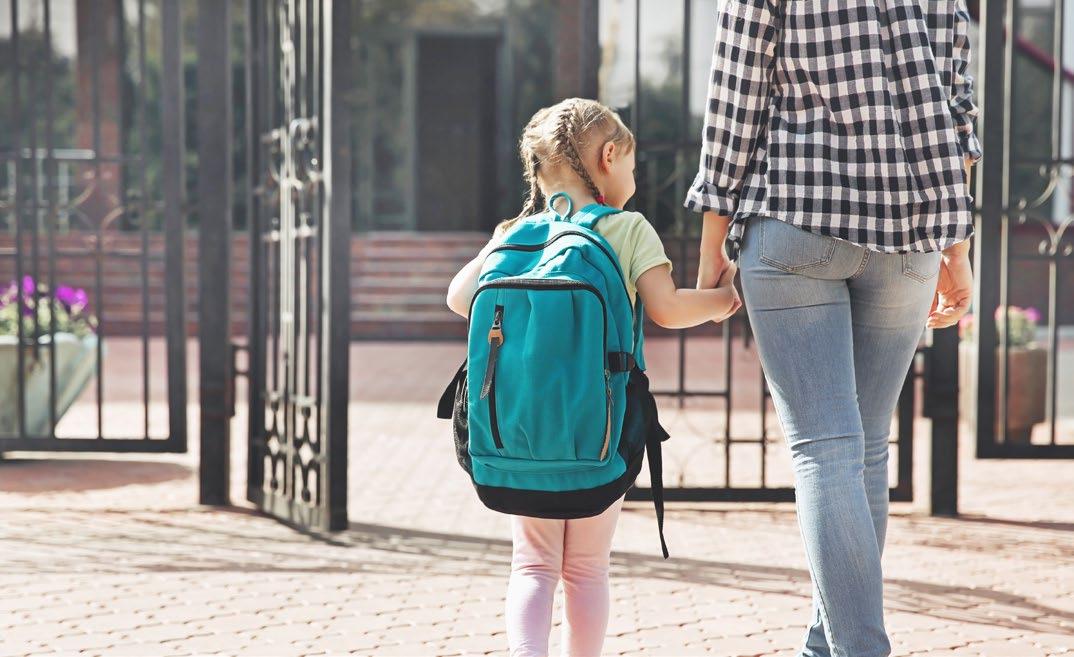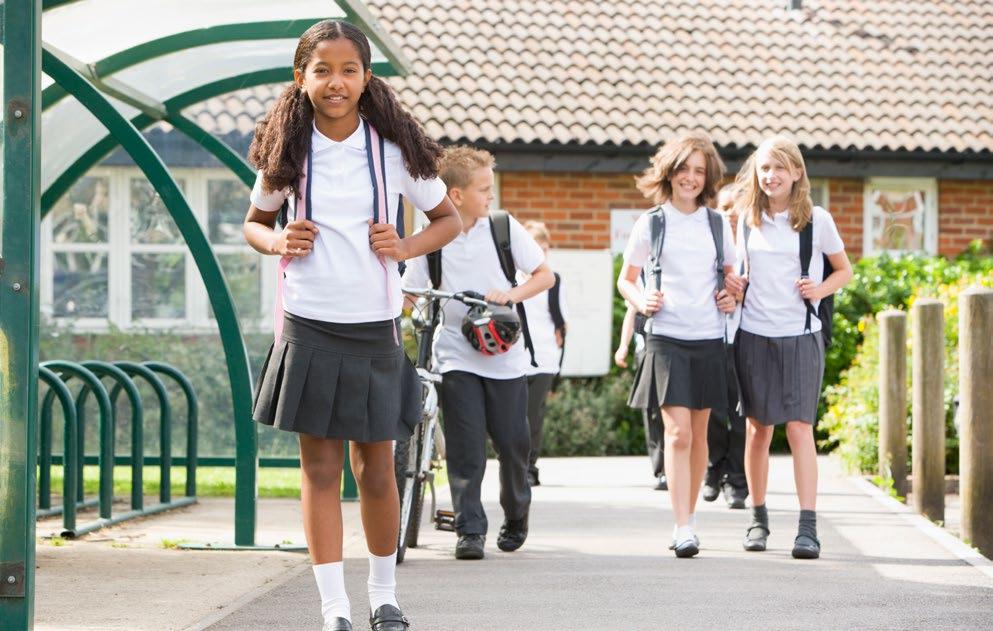
9 minute read
Education
Five “Must-Do’s” When Choosing a School for your Child
By Judith Judd
When my daughter was four, she came with us to visit several primary schools. Afterwards, we asked which she liked best. “The one with the shoe shop” she said. As it happened, we also liked the one with the (pretend) shoe shop and so that is the school we chose.
Maybe it doesn’t always make sense to take a 4 year old’s advice when choosing a school but it’s always important to put your child at the centre of the process. Parents know better than anyone how different individual children can be.
The first rule for choosing a school is to ignore the label. Research about different types of schools – academies, specialist, free, grammar - reveals that the type of school doesn’t guarantee the level of the education.
The second is to visit the school. When you do, check out the relationship between children and teachers. Do teachers pay attention to what the children are saying? Do they respect them? You want your child to be happy at school and the relationship with teachers matters.
Find out what progress pupils make during the time they arrive at school and by the time they leave. Schools’ exam results at GCSE and in national tests at age 11 give an idea of the sort of children who attend the school but they don’t indicate progress. You can get an idea how good a school’s teaching is by looking at progress measures available on government websites for that school. Look at the Ofsted report. Inspectors give ratings: outstanding, good, requires improvement, inadequate. But equally important is their assessment of how different groups of children fare. A school may do well with able children but not those who struggle and vice versa. The reports also give an idea of a school’s strengths and weaknesses. That’s particularly important for older children who may have particular talents and interests.
Talk to the Head Teacher. Leadership is crucial to a school’s success. It’s important that you have confidence in the Head and that she/he impresses you with their engagement with staff and pupils.
Whilst choosing a school feels like a daunting process, bear in mind also that research shows that whilst schools and teachers are important in helping children thrive, parents’ support at home matters more.
Judith Judd is co-author, with Wendy Berliner, of the book How to Succeed at School: Separating Fact from Fiction: What Every Parent Should Know. Published by Routledge and available from Amazon and good book stores.
A Word about Grammar Schools
Concerned that there are no grammar schools in your area?

This may not be something you need to worry about.
A big study from Durham University suggests that bright children do just as well in non-selective schools as grammar schools. Professor Stephen Gorard says: “Dividing children into the most able and the rest does not appear to lead to better results for either group.” He says that there is no evidence that a particular type of school leads to better attainment.
However, he adds that parents may choose grammar schools for the reason that they tend to cream off the more advantaged pupils in an area so that the neighbouring schools have to cope with a disproportionate number of disadvantaged and more challenging children.
Reception Testing Delayed to 2021

The government’s plan to introduce Reception Baseline Assessment (RBA) will be delayed until September 2021 because of the disruption caused by the coronavirus pandemic.
In September 2017, the Department for Education announced that a new start-of-school assessment for children ages 4 and 5 would be introduced as a baseline measure to track progress during primary school.
The test is due to eventually replace key stage 1 SATs in providing the baseline on which pupil progress scores are based. The new tests have been criticised by some teachers, Head Teachers and parents, who claim it is unnecessary, will cause distress and could damage children’s future learning.
EARLY YEARS DIRECTORY



Bambini Nursery
Ewell KT19 0EB Bambini Nursery offer full day and nursery day sessions for children from 3 months to 5 years. www.bambininursery.co.uk

Brightsparks Day Nurseries
Purley, Old Coulsdon, South Croydon & Selsdon Brightsparks Day Nurseries provide part-time and full-time care in safe, stimulating, and enjoyable environments for children from 3 months to 5 years. www.brightsparksdaynurseries. co.uk
King Fisher Nursery
Thornton Heath, Croydon & Coulsdon Baby Unit, Day Nursery and Preschools providing a safe, fun, happy, caring and friendly ‘home-fromhome’ environment. www.kingfishersnurseries.co.uk
Little Learners Day Nursery
Croydon & Purley Little Learners Day Nurseries provide high quality affordable childcare in a safe, fun and stimulating environment. www.little-learners.net
Montessori Children’s House Nursery School
Sutton SM1 2RG Based in a large open-plan classroom with lots of natural light and a safe garden area offering spaces for children between 2 to 5 years. https://sites.google.com/view/ montessorisutton
Play BC
Wallington & Carshalton Play B C is a teacher-led preschool in Wallington for children between two and five years of age, with a NEW venue opening in Carshalton this September. www.playbc.co.uk

Shapes Day Nursery
Reigate, Epsom & Banstead An independent family business operating out of three beautiful well-located and fantastically resourced settings, Shape create an atmosphere of happiness. Each Nurseries can take up to 100 children from 0-5 years. www.shapesdaynursery.co.uk
Tadworth Tots Nursery
Tadworth KT20 5RU Offering both morning and afternoon sessions to children aged 2 to 5, Tadworth Tots Nursery is located within The Children’s Trust School in Tadworth. www.thechildrenstrust.org.uk/ our-services/early-years/nursery
The Railway Children Kindergarten
Epsom Downs KT17 4JP The Railway Children Kindergarten is a privately owned independent nursery school in Epsom and provides a cosy and unique setting for preschool children aged 2–4 years. https://bit.ly/3jQ6Vt2
To advertise your school or nursery in our next issue, call Tamar on 07947 535986
Year 7 2021 Taster Morning: Saturday 10th October
Register by 30th September to secure your child’s place. Visit: www.dunottarschool.com/admissions for more information and to complete the online registration form.

Call our Admissions Team on 01737 761945.

Where Children Thrive
Independent Co-educational Day School For Pupils Aged 3-18

Nursery and Reception Places Available

OPEN EVENTS Thursday 24th September 6pm-8pm Sixth Form only Friday 2nd October 9am-10.30am Whole School Saturday 3rd October 9.30am-11.30am Whole School Tuesday 6th October 9am-10.30am Whole School www.ewellcastle.co.uk
Why Bribing Children is Bad for their Education
By Wendy Berliner
Many parents have been there. They have a child who will not eat vegetables or won’t tidy their room. Or any other behaviour from a long list!
With battle lines drawn and no significant improvement from hectoring or cajoling, bribery can follow. If you eat your broccoli, you can have your pudding; if you put your dirty laundry in the washing basket, you get extra pocket money.
It seems so simple, especially if it gets results. But should you be doing it? The answer from half a century of research is a resounding NO. Bribes and their frequent partner, punishment, don’t help children become capable of their most creative work.
A highly influential motivational theory known as selfdetermination developed in the 1980s after research found that paying students for solving puzzles actually demotivated them.
In essence, students offered money for solving Soma puzzles (precursors to Rubik’s Cube) lost interest when they were given extra unpaid time at the end of experiment to carry on solving puzzles. Students in a separate test who were not offered money carried on trying to solve the puzzles after they were told the test had finished.
Subsequent research with children and students of different ages with differing tasks has repeatedly confirmed the phenomenon.
The nub of the theory is that by offering rewards or bribes you undermine the value of the task and the motivation to do it.
Audiobooks Improve Literacy
Audiobooks can benefit children’s reading skills, according to new research published by the charity, the National Literacy Trust.

The report looks at the advantages of listening to a recording of a novel being read, and the impact on young readers.
The research suggests that listening to a recorded story requires the same mental skills as reading in print, so audiobooks can help with understanding words and remembering information. They can also give children access to a broader range of texts and engage readers who might be reluctant, struggling or developing.
Emily Best, from the National Literacy Trust, said: “Audiobooks can be the key to unlocking a child’s love of reading. They enable children of all reading abilities and interests to access and explore the incredible world of stories, which are brought to life by a range of exciting voices, different accents and sound effects.” There are two types of motivation – extrinsic and intrinsic (also known as controlled and autonomous). Rewards and punishment form extrinsic motivation. Someone is doing something to you to make you do something. It isn’t something you are doing by choice.

Intrinsic motivation comes from within and is what is needed to become an independent learner capable of your best work. It means you do things because of the enjoyment, interest and value you get from them not because someone tells you to.
A child who spends hours playing computer games is intrinsically motivated – it’s just not the kind of motivation that is necessarily good for them.
So how do you develop that all-important intrinsic motivation in your children?
The theory argues humans require certain needs to be met before they can become motivated from within.
Competence – we need to feel confident and effective in what we are doing. We have a human need to build our skills. To facilitate this, don’t tell your children they are no good at things if they struggle. That includes when you are trying to be kind – a comment like “I wasn’t any good at maths either” is telling them they aren’t competent.
Relatedness - we need to feel a sense of belonging to others, to feel cared for by groups that are important to us and to care for others. So make the atmosphere at home kind and supportive.
Autonomy – we need to be able to decide what we do rather than be coerced. To assist with this, help your children learn to take responsibility for what they are doing, so that they can make good choices by themselves on how to use their time.
That last one is really important. The child who understands the importance of getting good grades at school if they want a worthwhile and interesting career, may internalise those arguments and do their homework willingly because they see the value of doing so; they have become autonomously motivated.
Over to you!
Wendy Berliner, with co-author Judith Judd, are authors of the book How to Succeed at School: Separating Fact from Fiction: What Every Parent Should Know. Published by Routledge and available from amazon and good book stores.
Sources Deci, E. L. (1971). ‘Effects of externally mediated rewards on intrinsic motivation’. Journal of Personality and Social Psychology, 18(1), 105-115. http://dx.doi.org/10.1037/h0030644 Deci, Edward L., Ryan, Richard M. (1985) ‘Intrinsic Motivation and SelfDetermination in Human Behavior’. Springer Science & Business Media.





